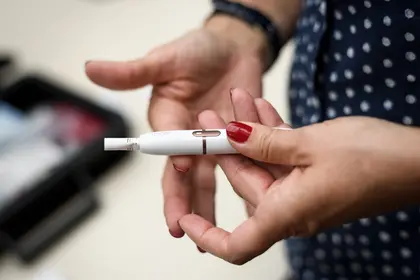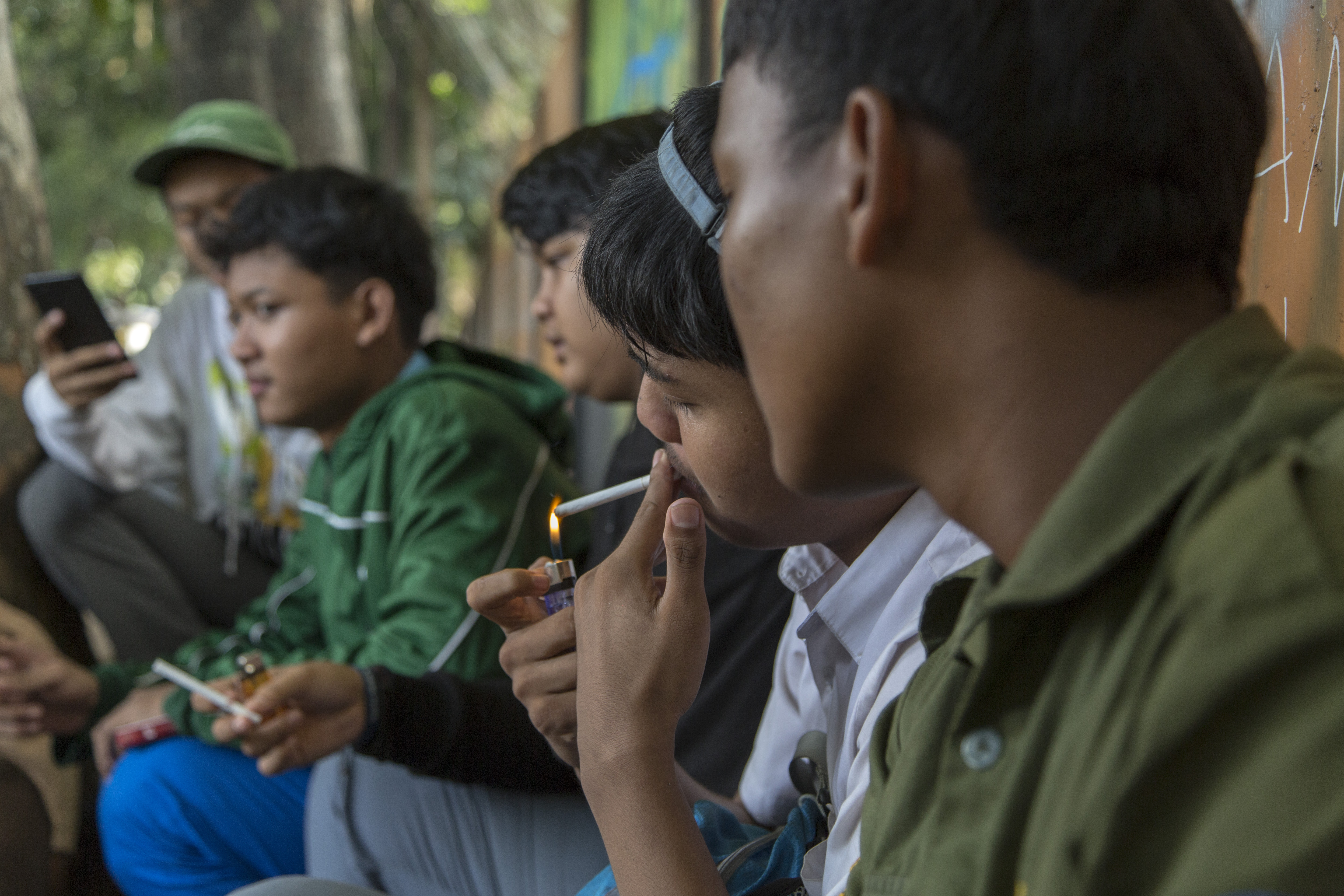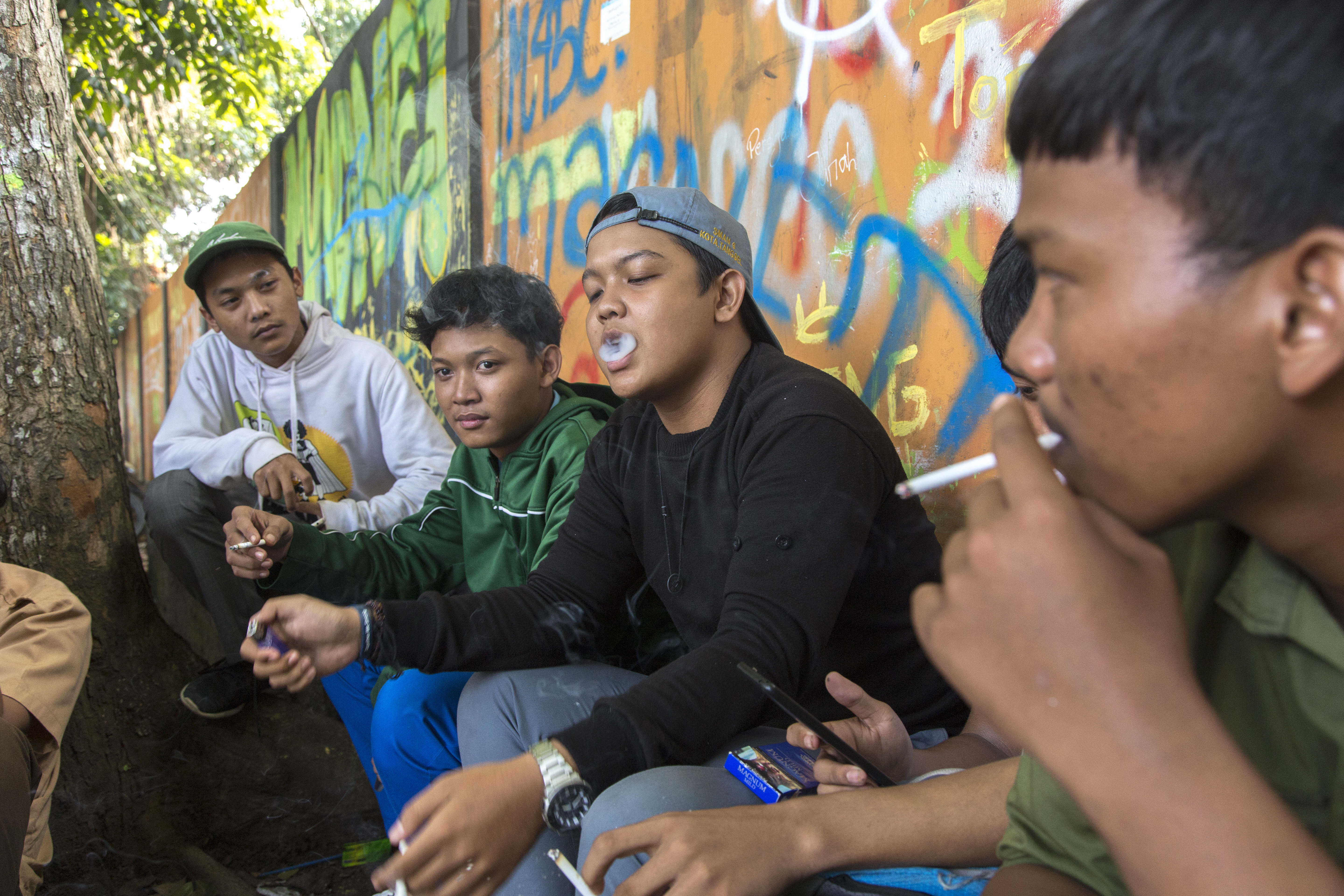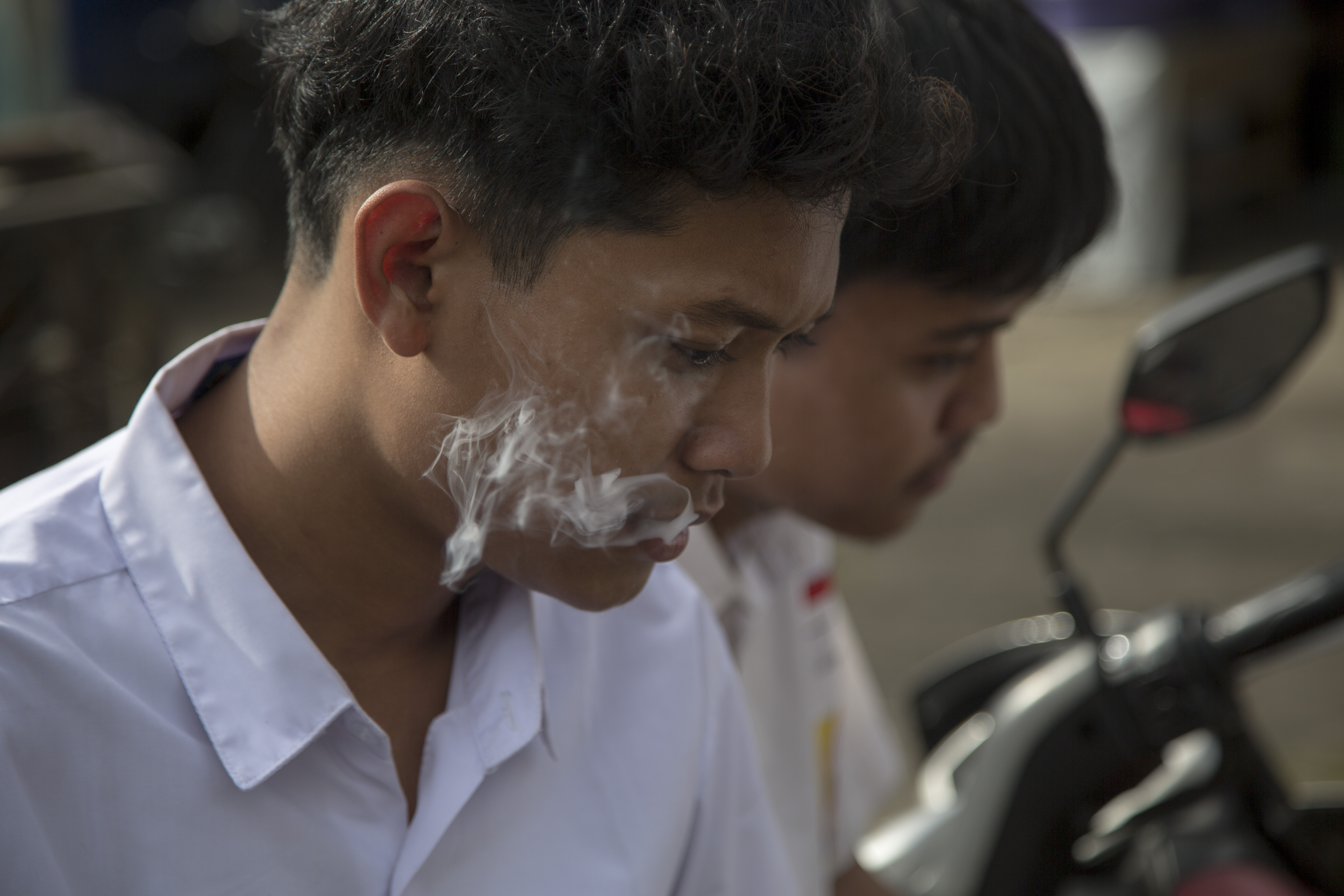Editor’s Note: This story is a joint investigation by the Kyiv Post and the Bureau of Investigative Journalism, based in London.
Two young women are dancing in dresses colored white, black, orange and blue. It’s not their colors of choice: These are the colors of the latest model of IQOS, a tobacco-heating device that they are promoting.
JOIN US ON TELEGRAM
Follow our coverage of the war on the @Kyivpost_official.
That is a new advertising campaign by Oh My Look, a Ukrainian dress rental service, in collaboration with Philip Morris International, PMI, a multinational tobacco producer and the creator of IQOS.
The video was released on the Instagram account of Oh My Look, which currently has 173,000 followers, on Dec. 26, 2019. It offers 30 users of the social media platform a chance to win a certificate for a free dress rental if they register on IQOS’s official website in Ukraine and follows its Instagram account.
“Meet the wow-collaboration of the year – Oh My Look x IQOS @iqos_ua and our New Year presents,” the publication says.
Sofia Suvorova and Anastasiia Yemeliashyna are the two dancers from the video. Both are Oh My Look employees and list their age on social media as 24 and 23, respectively — younger than what PMI’s own “marketing standards” allow an influencer to be.
This video, a collaboration between Oh My Look and IQOS, was released on the Instagram account of Oh My Look dress rental on Dec. 26, 2019.
Back in May 2019, PMI was forced to suspend its entire international social media influencer campaign when a Reuters investigation revealed that the company had hired models who were under 25, going against its internal guidelines.
“Our guidance called for influencers to be 25+ years of age. This was a clear breach of that guidance,” PMI commented on the Reuters’ findings.
When asked by the Kyiv Post why PMI continues hiring attractive young influencers to promote IQOS despite promises to deter young people from using the product, the company denied that it does so.
“We have not engaged with individuals you refer to in your email and have no affiliation to their social network accounts,” Oleksii Kalynichenko, Head of Communication Eastern Europe, said in an email, commenting on the video featuring Suvorova and Yemeliashyna.
He did not comment on the IQOS partnership with Oh My Look.
But stories like this are hardly uncommon. International electronic cigarette companies frequently enjoy more freedom in Ukraine than in the West and often undertake controversial practices that wouldn’t be welcome in other countries.
What is IQOS?
IQOS is widely believed to be an acronym for “I Quit Ordinary Smoking” – although PMI consistently denies this. The device is a sleek gadget that looks like a cross between an iPod and an expensive pen and is now available in 52 markets worldwide, including Ukraine.
While it resembles an e-cigarette, or vape, there is a key difference: it contains tobacco, whereas e-cigarettes only hold a nicotine solution. IQOS warms up sticks of tobacco to 300 degrees (much lower than the 800 degrees of a burning cigarette) until tendrils of aerosol are released. It mimics the rituals of smoking and gives users a satisfying kick of nicotine with fewer carcinogens.
PMI calls IQOS a heated tobacco or “heat-not-burn” device. It is part of a new class of products in between vapes and traditional cigarettes.
Since IQOS launched in 2014, PMI has promoted it as a “part of the solution” to smoking. It spent billions publicizing this agenda, hiring advertising, PR and lobbying companies to promote a narrative of new, purpose-led and responsible business practices.
Aggressive promotion in Ukraine
In countries like the United Kingdom or the United States, regulations severely limit advertising opportunities for tobacco giants like PMI. However, in Ukraine, such companies have more leeway in their PR campaigns due to tobacco laws that activists say are way too soft.
In Ukraine, IQOS promotion is bold and often takes place in the media. On Jan. 11, Vogue Ukraine magazine published an article suggesting that the latest model of IQOS was a “stylish and well thought out” present to give someone in 2020.
The “ultra-modern gadget for tobacco heating not only has a fashionable design but also an advanced functionality every smoker will appreciate,” the article reads.
Similar pieces promoting the so-called IQOS lifestyle ran in L’Officiel and Marie Claire magazines in Ukraine.
L’Officiel included IQOS in its list of things that will “change your life in the next year” while Marie Claire encouraged readers to buy IQOS as a present for Secret Santa or Valentine’s Day. Aristocrats, a Kyiv-based radio station, made their studio “IQOS-friendly” and, ever since, has featured the product’s logo during live video broadcasts.
If there is a fashion event in Ukraine, PMI is there. In 2019, it partnered with Ukrainian Fashion Week, setting up two interactive zones, a branded catwalk with an unlimited prosecco tap and a 3D cinema live-broadcasting the show’s backstage.
In 2019, IQOS also partnered with the Ukrainian Film Academy, which honors the best films, actors and directors in Ukraine. PMI had a promo zone at the awards ceremony as well.
However, the company’s marketing tactics were even more intense a few years ago. “In 2016, we did not miss a single fashion event (in Ukraine),” Dmitriy Zinchenko, Head of Digital at PMI, said in 2018 during a speech at Future Lab, a marketing conference in Kyiv.
“Such presence gave us a reference as a premium segment product,” he continued.
In 2017, PMI’s promotions in Ukraine also involved offering a free IQOS trial at family-style street food markets, according to anti-tobacco activists. For its PR campaign, the company was awarded an “Effie” in 2019, a prestigious international marketing communication prize.
Along with IQOS, the PR company that created the promo, Hoshva PR, also received the award. Its former chief operating officer, Alena Taranenko, on Feb. 17 presented a new “brand philosophy” she created for IQOS. Their new motto is “Allowed.”
Alena Taranenko, a partner at Ten’ (Shade) PR agency, on Feb. 17 presented a new “brand philosophy” she created for IQOS. The new motto of IQOS in Ukraine is “allowed.”
“The philosophy of IQOS allows doing what you want. You know why? Because ‘IQOS Ukraine’ can,” Taranenko wrote on her Facebook.
IQOS’s “manifesto” in Ukraine shows the extent of the permissiveness PMI enjoys in the country, where anti-tobacco laws have not been updated since 2012.
Targeting youth
The new IQOS motto in Ukraine, “Allowed,” was first spotted in action in Kyiv in February, when information about a “secret Valentine’s party” organized by IQOS started spreading on Instagram and Facebook.
The party, called “Singles allowed,” was an exclusive invitation-only event that welcomed jet setters in Ukraine’s capital. On Feb. 13, Lera Borodina, Oh My Look’s owner and an Instagram influencer with an audience of 242,000 people, recorded a video promoting the party.
The entrance was “invitation-only,” emphasized Borodina, who is often pictured holding an IQOS on Instagram. She then encouraged her followers to compete for 20 tickets to the private gathering, a chance to “hang out with cool people.”
Pascal Diethelm, president of Oxysuisse, a Swiss NGO dedicated to tobacco prevention, believes PMI is using the “theory of diffusion of innovation” in which “early adopters” of a product tend to be richer and more privileged than the rest of the population. As this group adopts a product, they influence the rest of the market, including young people.
Diethelm believes this is why IQOS is being marketed as a luxury, hi-tech, aspirational product. PMI needs young people to create a new market, he said, as the experienced smokers-turned-consumers of IQOS could not sustain the company indefinitely. Those smokers will die.
Researchers from Stanford University devoted a report to IQOS’s global marketing. They interviewed ambassadors called coaches, attractive people paid by PMI to convert smokers to IQOS. They sometimes used the hashtag “be like me,” drove around in IQOS-branded cars and wore letterman jackets spelling out IQOS. The coaches often staff IQOS-branded parties wearing trendy clothes or beachwear.
The researchers also found Instagram posts that seemed to target even younger users. Instagram posts from Ukraine, Armenia and Japan showed young girls posing with pastel-colored IQOS devices. Others posed the devices against a backdrop of ice cream, palm trees and seashells.
“It has used the exact same strategy and the exact same images it used to make Marlboro the most popular cigarettes for kids worldwide,” said Matt Myers, president of the Campaign for Tobacco Free Kids.
“If governments don’t respond strongly and directly, Philip Morris International will use IQOS to renormalize tobacco use and reach a whole generation of young people who otherwise never would have smoked.”
PMI will be wary of the backlash faced by Juul, the maker of America’s most popular e-cigarette, over accusations its early marketing appealed to teenagers. The company denies it ever targeted children, but has since faced congressional hearings, federal investigations and hundreds of lawsuits.
It is against this backdrop that Andre Calantzopoulos, a chief executive at PMI, maintains that he only wants IQOS targeting the world’s 1.1 billion adult smokers. However, an Italian study found that nearly half of people who had tried the product had never smoked, and PMI appears to be recruiting occasional or social smokers to promote its devices.
“I don’t smoke often, maybe only when I am at a party or having a glass of wine with some friends, but I was interested to find out about this device,” Gabriele Gzimailaite, a London-based fashion blogger told her readers in November 2017.
Gzimailaite, who has 120,000 Instagram followers, had been flown out to Milan by PMI for an IQOS party where she posed against an IQOS-branded wall and posted pictures of the device.
Five months later, PMI paid for her stay at the luxurious Rosewood Hotel in London, which has launched IQOS-friendly rooms. Gzimailaite posted a picture of herself posing in a marble bubble bath and drinking a glass of rosé with her black IQOS and a magazine at her side. Other non-smokers have also promoted IQOS.
Calantzopoulos’ promise not to target non-smokers or teenagers is disingenuous, activists say. They argue that, if PMI only convinced existing customers to switch to IQOS without attracting new ones, as it claims it wants to do, the company would go out of business within a generation.
Fake health claims
IQOS’s campaigns aim to associate the product with a healthier lifestyle by featuring social media influencers, events, collaborations, glass-fronted shops and an army of brand ambassadors, according to a report compiled by Stanford University.
“The advertising tries to portray IQOS as aspirational, high tech, healthy, fashion-conscious, clean fun and link it with fashion, travel, leisure and relaxation. Some adverts imply IQOS helps make people more successful in romance by improving their kisses and their teeth, as well as being a good way to show love to family and friends,” said Professor Robert Jackler, who led the research.
Instagram posts show IQOS with coffee, alcohol, food or next to laptops. Young, attractive professionals are shown laughing, socializing or looking happy with their devices. Some ads show IQOS with surfers and runners, implying it is a product suited to healthy, outdoorsy lifestyles.
Stanford researchers also uncovered examples of explicit health claims by PMI worldwide. These include a post from IQOS’s Instagram page in Japan that promotes it as a way to avoid lung cancer, emphysema and heart attacks, which experts say is not backed up by evidence.
In the U.S. and U.K., PMI cannot legally claim IQOS can help users quit smoking or lower the risk of disease. However, in Ukraine, it is not banned from doing so.
“Entirely switching to IQOS reduces the risk to your health in comparison to continuing smoking,” IQOS’s official website in Ukraine says next to an image of a young girl with a coffee mug and an IQOS.
In 2017, PMI officially laid out its vision for a “smoke-free” future. Calantzopoulos started giving interviews about his company’s “transformation.” He wanted to switch smokers to IQOS, which he said was less harmful and could save their lives.
A global campaign called “Unsmoke Your World” promoting the idea that anyone could become an “Unsmoker” was released a year later and became a hit in Japan, South Korea, Italy, Russia and Ukraine.
The “Unsmoke” mission is a marketing campaign for IQOS and a blatant attempt to rehabilitate the company’s image in order to influence policy and regulations. Arguably, it has succeeded: although smoking rates have fallen in the past decade, PMI’s profits and share price have increased.
Experts fear that PMI could lure a new generation into addiction with its new products, whose long-term health risks are unknown, and discourage people who might have quit altogether from doing so.
“These multi-billion-dollar companies will do everything they can to stay in business,” said Vinayak Prasad, head of the World Health Organization’s tobacco control division. “What they are saying is far from the truth.”
The battle for lower taxes
Calantzopoulos says that 8.8 million smokers have switched to IQOS since the product’s launch. His ambition is to switch 40 million smokers from cigarettes to PMI’s alternative products by 2025. He calls it a win-win: better for the smoker and better for PMI, which can get better profit margins from IQOS if it is subject to lower taxes than cigarettes.
And to the chagrin of the World Health Organization, PMI’s lobbyists are working around the world to persuade governments not to tax IQOS like cigarettes.
In Ukraine, IQOS is taxed 3.5 times less than traditional cigarettes, and that will remain in place until 2021 when local authorities will begin equating the tobacco sticks with traditional cigarettes.
This amendment to the tax regulation enraged PMI’s top manager in Ukraine, Michalis Alexandrakis. On Nov. 25, 2019, he showed up at a meeting between Ukrainian lawmakers and representatives of tobacco companies in Kyiv. The tax increase for heated sticks like IQOS was on the table.
According to a recording of the closed-door meeting leaked to the Kyiv Post, Alexandrakis aggressively and emotionally backed IQOS.
“IQOS is less harmful than cigarettes, it is a fact…We need also to understand another fact – if people switch to IQOS, they quit smoking,” Alexandrakis said.
Alexandrakis argued that IQOS users will return to traditional cigarettes after the tax increase, which he said amounts to “killing IQOS.” He then proceeded to accuse the Ukrainian authorities of a bait-and-switch, saying they could not change the legislation after PMI invested $120 million to launch IQOS in Ukraine because it is “not fair.”
After critics argued that IQOS targets Ukraine’s youth, Alexandrakis said: “We know very well that the problem with the youth is not related to IQOS, it is not related to ‘heat-not-burn’ products, it is related to vaping. It has nothing to do with IQOS. That is what we all know but we keep repeating IQOS.”
He then claimed that his company is not going too far in promoting IQOS in Ukraine. If PMI wanted to, it would have run TV ads, but it did not because of its “responsible” approach, he said.
Indoor IQOS puffing
PMI is “dancing around” the definition of smoke to avoid indoor smoking bans for IQOS, believes Reto Auer, a doctor and researcher at the University of Bern.
Auer and his team set up a study to determine whether IQOS produces smoke or not. They concluded it does.
“Basically, what the IQOS is – is a portable toaster,” he said. “If you leave your bread long enough, it will become black. At what point do you say your toast is burnt? Is that bread vapor that comes out of your toaster? No, we call it smoke.”
In Japan, while indoor smoking is banned, IQOS is not; “no smoking, IQOS only” signs are common. “If you have only the IQOS indoors, and all other cigarettes outside, then you have no competitors,” Auer said.
In countries including Ukraine, Romania, Colombia and Spain, PMI has created its own cafés and lounges where menus pair coffees with particular flavors of IQOS tobacco sticks. It has launched a global network of “IQOS-friendly spaces” — bars, hotels, restaurants and public areas like beaches where people can freely puff on their IQOS.
Mapping IQOS’s launches reveals a pattern. IQOS has mainly been promoted in countries that have introduced smoking or tobacco advertising bans and where cigarette sales were falling, according to an analysis by the University of Bath. “They needed something else to make a profit in the future in those countries because people were stopping smoking,” said Karen Evans-Reeves, co-author of the report.
Moira Gilchrist, a vice-president of PMI, said: “For PMI, the long-term business opportunity is to convert adult smokers who would otherwise continue to smoke cigarettes to better alternatives.
Hypocritically pushing cigarettes sales
In 2017, PMI’s chief executive announced a new ambition for his company: to phase out cigarettes entirely. Such a claim made headlines all over the globe.
Despite the PR push, PMI’s stated aims do not match its business practices.
Its revenues from alternative products shot up from 0.2% in 2015 to 14% in 2018, but the vast majority still came from cigarettes. The company sold more than 740 billion cigarettes in 2018 and only reduced production by 1%.
Calantzopoulos also repeatedly assured investors that PMI would remain a “leader” in cigarette sales and would not give up its market share to competitors.
Since PMI announced its aim to stop selling cigarettes, it has acquired new cigarette companies, launched new subsidiaries and brands and added enticing new flavors to existing products.
PMI has also continued to advertise cigarettes in all countries that permit it.
School students in Indonesia can see PMI’s cigarette advertising five steps from their schools’ gates. Young people attending festivals in Buenos Aires are offered PMI cigarettes in promotions with beer. Children visiting corner shops in Costa Rica see different flavors of Marlboro’s “fusion” cigarettes next to sweets and chocolates.
“There’s a certain disingenuousness to the whole thing,” said Richard O’Connor, who until recently sat on the U.S. Tobacco Products Scientific Advisory Committee (TPSAC) panel advising the country’s Food and Drug Administration. “They can stop marketing cigarettes and market the heck out of IQOS and actively encourage people to use it. If you want to shift the market and you control most of that market, you could easily do it.”
“Our vision is that one day smoke-free products will replace cigarettes. The sooner the world transitions away from cigarettes, the sooner we can stop making them,” said Gilchrist, PMI’s top-manager.
IQOS has yet to launch in Indonesia, PMI’s biggest market for cigarettes. There, more than two-thirds of men and one in five teenagers smoke. People in their 30s are dying of heart-related diseases linked to tobacco. Videos of toddlers addicted to PMI cigarettes appear regularly.
Calantzopoulos’s desire to phase out cigarettes may be genuine, but he is hamstrung by an obligation to make a profit for shareholders, which rules out suspending cigarette advertising or sales.
Perhaps Indonesia’s smokers will all eventually quit or switch to alternatives. But, under the neon lights of the country’s Marlboro Penthouse, that day seems a long way off.
You can also highlight the text and press Ctrl + Enter










